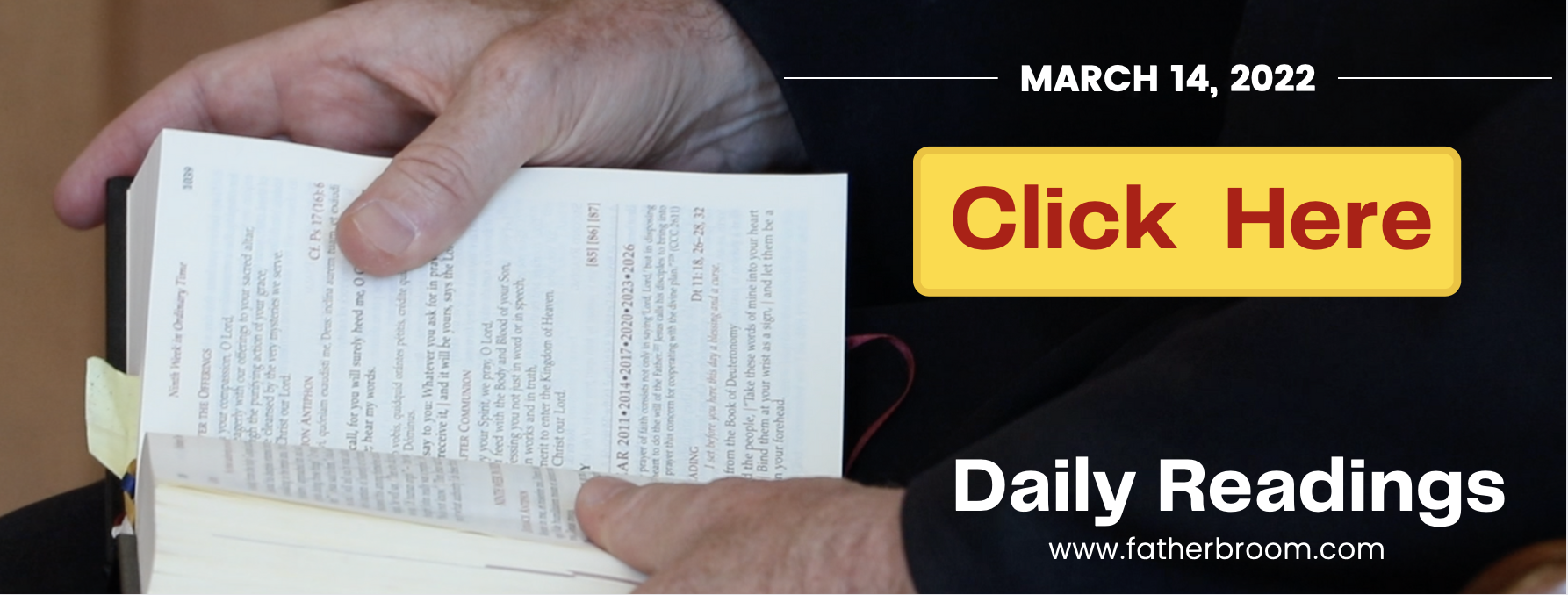Monday of the Second Week in Lent



“For greater things you were born.” (Ven. Mother Luisita)
MONDAY, March 14th Lk. 6: 36-38 “Jesus said to his disciples: ‘Be merciful, just as your Father is merciful.”
Mercy is the fruit of forgiveness…
FIVE WAYS TO PRACTICE FORGIVENESS by Fr. Ed Broom, OMV
The renowned English poet Alexander Pope stated: “To err is human; to forgive is divine.” How true this statement, but how difficult to carry out! At the same time, holding on to resentment is interior slavery. Whereas, truly forgiving is imitating God Himself and setting the captive free, and that captive is us!
Frequently and in unequivocal terms, Jesus has reaffirmed the indispensable obligation of all to forgive those who hurt us, pray for our enemies, and even to do good to them if the opportunity presents itself! Once again, easier said than done! Actually, without God’s grace, to forgive those who have wounded us, and to love and pray for our enemies, far transcends and supersedes our natural powers. In sum, we need Gods’ grace to forgive our enemies.
Jesus is our example in absolutely all we say, and do, and even think in our daily lives! Indeed, He said it clearly: “I am the Way, the Truth, and the Life.” (Jn 14:6) Jesus first began by doing and then by preaching. First actions, then words. His very demanding teaching on forgiveness He lived to perfection at every stage and moment of His earthly existence.
What are some of the teachings of Jesus on mercy and forgiveness? Let’s meditate on a few of them. “Be merciful as your Heavenly Father is merciful.” (Lk 6:36) In response to Peter’s generous willingness to forgive seven times, Jesus put no limits on it: “No, I say to you, not seven times, but forgive seventy times seven.” (Mt 18:22) This is hyperbole for the imperious obligation to forgive always, without limits or reservations.
Then Jesus made a Liturgical/Mass allusion. He said if you come to Church to present your offering and you know that your brother has something against you, simply leave the offering at the foot of the altar, reconcile with your brother, and then return to offer the gift. In other words, to celebrate worthily the Liturgy we should strive to be at peace with our brothers and sisters, and not be angry and resentful towards anybody.
Then in the most famous prayer in the world, the Our Father, Jesus gives us this very important command: “Forgive us our trespasses as we forgive those who trespass against us.” In other words, forgiveness from God is a two way street. If we want to be a recipient of God’s forgiveness, it is necessary that we forgive those who hurt us.
Finally, the most eloquent witness of God’s forgiveness for all of humanity and for each of us individually, is Jesus hanging on the cross after having been scourged, crowned with thorns and spat upon, derided and mocked incessantly, and finally abandoned by all those He loved but three faithful ones: Our Blessed Mother, Mary Magdalene and St. John. What is His response as He hangs on the cross ready to breathe forth His spirit? These words, “Father, forgive them, for they know not what they are doing.” (Lk 23:34)
To help us imitate Christ and obey His command to forgive, let us expand on five concrete suggestions to help us on the pathway to forgiveness and mercy!
1. Beg for the Grace
To forgive our enemies, to pray for them and to love them goes far beyond our fallen human nature. We desperately need God’s overflowing and abundant grace! Saint Augustine says that we are all beggars before God. Therefore, we should beg fervently for the grace to forgive others when we are put to the test. God will not deny us this sincere petition and important grace!
2. Forgive Immediately
When we are offended, most often the devil begins working on us right away fostering in our minds thoughts of revenge. Such ugly and vindictive thoughts can easily surface: “Get even!” “Teach them a lesson.” “Give them a taste of their own medicine.” “An eye for an eye and a tooth for a tooth.” Finally, “Don’t let them get away with this.” At best, this might express our sentiments as a Protestant preacher once said succinctly: “We will forgive them but only after we see them squirm like a worm in hot ashes, at least for a while.” All of these thoughts and feelings are diametrically opposed to the teachings of our Merciful Savior, and we must resist and reject them as soon as we become aware of them. If we respond to God’s grace of merciful forgiveness and forgive immediately, there is a very good chance the victory will be ours. In sum, be quick to reject vindictive thoughts, and even more quick to forgive!
3. Humility
Another efficacious spiritual weapon that we have in our armory is that of humility. How? In this way! If forgiveness proves laborious and near impossible, then call to mind your worst and most embarrassing sins and the fact that God forgave you as soon as you begged Him for mercy and forgiveness. Most likely the offense leveled against you now is minimal compared to your most grave and embarrassing sins. This can be a very powerful tool to open up your heart in mercy and forgiveness for others!
4. Mercy is a Two-Way Street
Next, remember that receiving God’s mercy is not a one-way street, but rather a two-way street! Meaning? Jesus said: “Be merciful as your Heavenly Father is merciful.” (Lk 6: 36) Therefore, if we want to experience God’s Infinite Mercy in our lives, we must first extend merciful forgiveness to those who have offended us. Let us recall once again the prayer Jesus taught us, the Our Father: “Forgive us our trespasses as we forgive those who trespass against us.” We will be forgiven only as much as we forgive others! Saint Faustina Kowalska in the Diary: Divine Mercy in My Soul asserts unequivocally that God’s greatest attribute or virtue is His Infinite Mercy. Followers of Jesus, the merciful Savior, must practice this sublime but very demanding virtue if they desire to receive His mercy! Mercy is God’s love forgiving the sinner. Our decision to forgive our enemies is a clear sign of the victory of God’s grace and mercy in our lives.
5. Jesus Bleeding and Dying on the Cross for You
Possibly the most convincing motivational force to compel us to forgive those who offend us is the serious and silent contemplation of Jesus hanging on the cross, shedding every drop of His most Precious Blood to save all of humanity, but in particular your immortal soul! When you have been hurt and remain unwilling to forgive, lift up your eyes to contemplate Jesus as He hangs from the cross. Remember what He has already gone through: sweating Blood in the Garden, scourging at the pillar, crowning with thorns, denied by Peter, betrayed by Judas, condemned and nailed to the cross though He was totally innocent, shedding every last drop of His Precious Blood, all for love of you.
What were the first words that issued forth the most Sacred Heart of Jesus on the cross? Listen and contemplate: “Father, forgive them, for they know not what they are doing!” (Lk 23: 34) Meditating upon these words, coupled with the contemplation of Jesus’ bitter Passion as He hung on the cross and shed His most Precious Blood for you, should be the most efficacious tool/hammer to crush your hardened heart that is unwilling to forgive!
Finally, beg Our Lady of Sorrows and Our Lady of Mercy for the grace to forgive. Nobody ever suffered more than Mary, aside from Jesus Himself! Still, as she witnessed her only Son suffer and die on the cross, brutally mistreated, she forgave us from the depths of her Immaculate Heart. May Our Lady attain for us the grace to forgive, to be merciful, and so merit the title of a son or daughter of God the Father, brother or sister to Jesus Christ, and friend of the Holy Spirit in time and for all eternity! Amen.